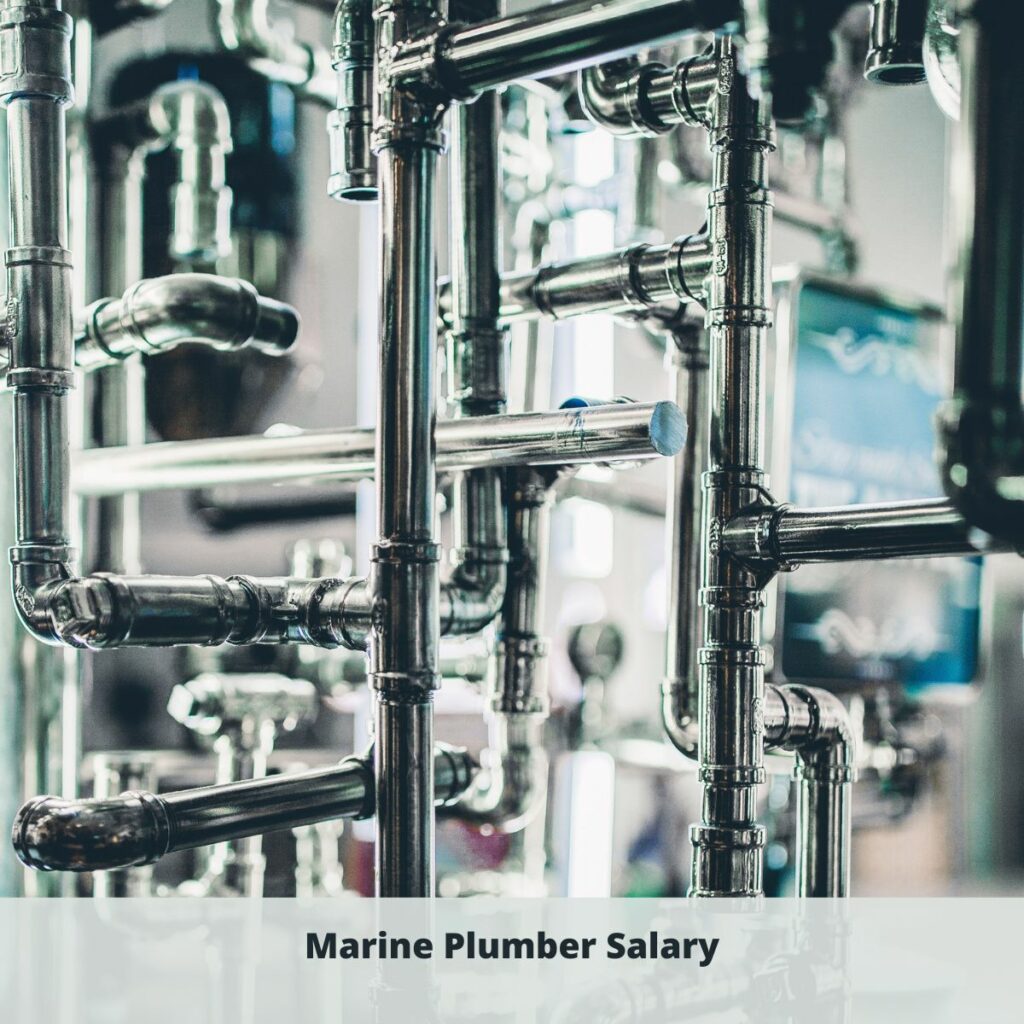Maritime Plumber Salary
As the demand for marine transportation continues to grow, so does the need for skilled professionals to maintain the vessels that keep our shipping lanes moving. One of the most critical roles in the marine industry is that of a marine plumber, responsible for ensuring the proper functioning of the ship's plumbing system.
What is a Marine Plumber?
Marine plumbers play an essential role in the maritime industry. They are responsible for installing, maintaining, and repairing plumbing systems on board ships and other marine vessels. The job of a marine plumber is challenging, and it requires a high level of skill, training, and experience.
If you're interested in pursuing a career as a marine plumber, it's essential to understand what the job entails and what you can expect in terms of salary and job outlook.
What Does a Marine Plumber Do?
The primary job of a marine plumber is to ensure that plumbing systems on board ships and other marine vessels are functioning correctly. This includes installing and maintaining pipes, valves, pumps, tanks, and other plumbing components. Marine plumbers must also work with heating, ventilation, and air conditioning (HVAC) systems and have experience with welding and metalworking tools.
Marine plumbers may work on a wide range of vessels, from cargo ships and tankers to cruise ships and offshore platforms. They are responsible for ensuring that plumbing systems meet safety standards and that they are installed and maintained according to industry regulations.
Marine plumbers must also be skilled in troubleshooting and diagnosing plumbing problems. They must be able to quickly identify the root cause of a problem and come up with a solution that is both safe and effective.
Marine Plumber Salary
The salary for marine plumbers can vary depending on several factors, including experience, location, and the type of employer. According to the Bureau of Labor Statistics (BLS), the median annual wage for plumbers, pipefitters, and steamfitters was $56,330 in May 2020.

However, this figure may not accurately reflect the earnings of marine plumbers, who may earn more or less depending on their specific job and location. In general, marine plumbers can expect to earn a salary that is competitive with other skilled trades in the marine industry.
For example, according to ZipRecruiter, the average salary for a marine plumber in the United States as of March 2023 was $62,834 per year. However, this figure can vary widely based on location, with marine plumbers in California and New York earning significantly more than those in other states.
Location
Location is another significant factor that can impact marine plumber salary. The location of a marine plumber's job can affect their salary due to differences in cost of living, demand for skilled tradespeople, and other economic factors.
According to Payscale, the average salary for marine plumbers in the United States is $61,000 per year. However, this can vary widely based on location. For example, marine plumbers working in New York City earn an average of $80,000 per year, while those in Houston, Texas, earn an average of $59,000 per year. This suggests that marine plumber salaries are generally higher in areas with a high cost of living or high demand for skilled tradespeople.
Other factors that can impact marine plumber salary based on location include the size and type of vessel that a marine plumber works on. For example, marine plumbers who work on larger vessels or offshore platforms may earn more than those who work on smaller boats or ships.
In addition to salary differences, the location of a marine plumber's job can also impact their job prospects. According to the Bureau of Labor Statistics (BLS), the states with the highest employment levels for plumbers, pipefitters, and steamfitters include California, Texas, Florida, and New York. Marine plumbers who are willing to relocate to areas with high demand for skilled tradespeople may have better job prospects and opportunities for career advancement.
Size and Type of Vessel
The size and type of vessel that a marine plumber works on can significantly impact their salary. Marine plumbers who work on larger and more complex vessels typically require more specialized knowledge and skills, which can lead to higher salaries.
According to data from Payscale, marine plumbers who work on large commercial vessels, such as cargo ships and tankers, can earn an average salary of around $85,000 per year. In comparison, those who work on smaller boats and yachts typically earn less, with an average salary of around $58,000 per year.
The type of vessel that a marine plumber works on can also impact their salary. For example, marine plumbers who work on offshore oil rigs or drilling platforms may earn more due to the hazardous and remote nature of the work. According to the Bureau of Labor Statistics (BLS), plumbers, pipefitters, and steamfitters who work in the oil and gas industry typically earn higher wages than those in other industries.
In addition to vessel size and type, the location of the vessel can also impact marine plumber salary. For example, marine plumbers who work on vessels in international waters or in areas with high demand for skilled tradespeople may earn more than those working in other locations.
Marine plumbers who specialize in certain areas, such as marine HVAC systems or marine electrical systems, may also be able to command higher salaries due to their specialized knowledge and expertise.
Experience and Education
Experience and education are critical factors that can impact marine plumber salary. The level of experience and education of a marine plumber can significantly influence their salary. In general, marine plumbers with more experience or advanced certifications may be able to command higher salaries than those who are just starting out in the field.
According to data from Payscale, the average salary for marine plumbers with less than one year of experience is around $45,000 per year. However, those with five to nine years of experience earn an average of $68,000 per year, while those with ten to nineteen years of experience earn an average of $78,000 per year.
Education is another critical factor that can influence marine plumber salary. Marine plumbers who have completed formal education or apprenticeship programs may have more knowledge and skills, which can lead to higher salaries. According to the Bureau of Labor Statistics (BLS), plumbers, pipefitters, and steamfitters typically complete an apprenticeship program, which combines on-the-job training with classroom instruction. The BLS reports that the median annual wage for plumbers, pipefitters, and steamfitters was $56,330 as of May 2020.
In addition to formal education and apprenticeship programs, marine plumbers may also seek out certifications and specialized training to enhance their skills and knowledge. For example, the American Boat and Yacht Council (ABYC) offers certifications for marine technicians, including a Certified Marine Electrician and a Certified Marine Technician. Marine plumbers who hold these certifications may be able to command higher salaries due to their specialized knowledge and expertise.
For example, the United States Coast Guard requires marine plumbers to have a Merchant Mariner Credential (MMC) with an appropriate rating. This credential demonstrates that the individual has met the training and experience requirements to work as a marine plumber on a vessel.
Other certifications, such as those offered by the National Inspection Testing and Certification Corporation (NITC), can also be valuable for marine plumbers. These certifications demonstrate a high level of knowledge and skill in specific areas of plumbing and can help marine plumbers to command higher salaries.
In addition to these factors, the job outlook for marine plumbers is generally positive, as the demand for skilled trades in the marine industry continues to grow. According to the BLS, employment of plumbers, pipefitters, and steamfitters is projected to grow 8 percent from 2019 to 2029, which is faster than the average for all occupations.
Job Outlook for Marine Plumbers
The job outlook for marine plumbers is generally positive, with opportunities for growth and advancement in the field. According to the Bureau of Labor Statistics (BLS), employment of plumbers, pipefitters, and steamfitters is projected to grow 8 percent from 2019 to 2029, which is faster than the average for all occupations.
One of the key drivers of this growth is the increasing demand for skilled tradespeople in the marine industry. As the global economy continues to grow, so does the demand for goods and materials to be transported by sea. This means that there is a growing need for skilled tradespeople, including marine plumbers, to install and maintain the plumbing systems on ships, boats, and offshore platforms.
In addition, there is a growing focus on sustainability and environmental protection in the marine industry, which is creating new opportunities for marine plumbers with expertise in green technologies. For example, marine plumbers who are trained in the installation and maintenance of water treatment systems or energy-efficient plumbing systems may be in high demand.
According to Payscale, the median salary for marine plumbers in the United States is $61,000 per year. However, this can vary widely based on factors such as location, experience, and the size and type of vessel that a marine plumber works on. As demand for skilled tradespeople in the marine industry continues to grow, it is likely that marine plumber salaries will also continue to rise.
In terms of job prospects, marine plumbers can expect to have good opportunities for employment in the coming years. In addition to the demand for skilled tradespeople in the marine industry, there is also a growing need for plumbers, pipefitters, and steamfitters in other industries such as construction, manufacturing, and utilities.






